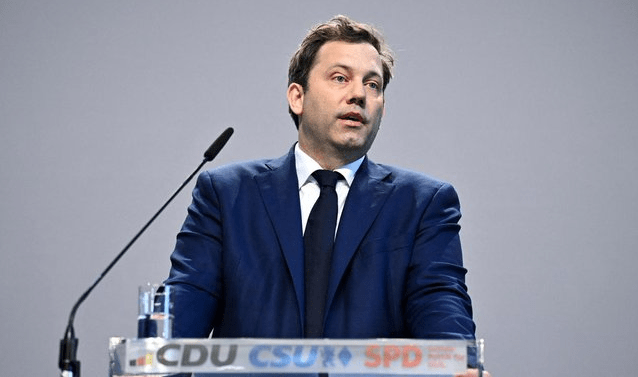BERLIN — In a political twist few saw coming at the year’s start, SPD leader Lars Klingbeil is set to become Germany’s next finance minister and vice chancellor, cementing his place as the most influential Social Democrat in Friedrich Merz’s incoming Cabinet.
The announcement came directly from SPD General Secretary Matthias Miersch during a press briefing at party headquarters in Berlin, confirming the unanimous backing of the party’s executive committee.
This marks a historic agreement between political rivals. The centre-left Social Democrats (SPD) and the conservative bloc led by Merz’s Christian Democratic Union (CDU) — alongside its Bavarian ally, the Christian Social Union (CSU) — have agreed to form a so-called “grand coalition.”
The deal was sealed following a party-wide vote among SPD members, with a commanding 84% voting in favour of joining Merz’s government. The new coalition is expected to be sworn in on 6 May.
At 47, Klingbeil brings both experience and political tact to the role. A political scientist from Lower Saxony, he took over leadership of the SPD in 2021. He previously served under former Chancellor Gerhard Schröder and has since earned a reputation for being pragmatic, strategic, and results-driven.
Though the SPD suffered a bruising defeat in recent elections, Klingbeil managed to turn the tide during coalition negotiations. His direct talks with Merz reportedly helped secure major concessions for his party, ultimately boosting his political standing.
“Klingbeil is the SPD’s key powerbroker in this Cabinet,” an insider noted during the announcement.
In his new position, Klingbeil will hold the purse strings of Europe’s largest economy. As finance minister, he’ll oversee the federal budget and shape Germany’s broader fiscal policies, both at home and on the global stage.
He is expected to play a pivotal role in:
- The restructuring of Germany’s defence spending
- Discussions around foreign development aid
- Long-term economic recovery strategies following recent financial strains
“His background in coalition building and fiscal policy gives him the edge we need,” one SPD official commented.
Lars Klingbeil’s appointment as finance minister is more than just a reshuffling of political chairs — it’s a calculated power move in a reshaped German political landscape.
As Merz takes the chancellorship, Klingbeil’s dual role as vice chancellor and finance minister sets the stage for a government where compromise, strategy, and influence will define the next chapter.






